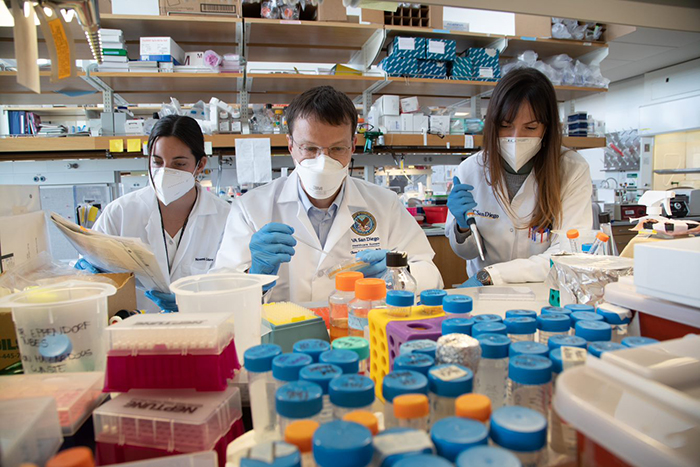Office of Research & Development |
 |


Dr. Bernd Schnabl and his team study bacteriophages, which are viruses that can target and kill specific bacteria and thereby help treat certain health conditions. (Photo by Kevin Walsh)
February 8, 2022
By Nancy Volkers
For VA Research Communications
"Phages represent a beautiful, self-perpetuating system of treatment. And if they don't find a host, nothing happens—they are eliminated without side effects."
Viruses that target bacteria are showing promise as treatment for some intestinal diseases, according to a review article authored by VA researchers.
Called bacteriophages, or phages, these viruses cannot infect human cells. Phages are incredibly diverse and exist everywhere in the environment, including in our bodies; in fact, humans contain more phages than human cells.

VA researcher works to improve antibiotic prescribing for Veterans

Veteran interest in Gulf War Illness reflected in new research study

Study: Delaying colonoscopy following abnormal stool test increases risk of colorectal cancer
Phages are naturally occurring viruses that attack and kill bacteria. A phage consists of a head, a sheath, and a tail. The phage uses its tail to attach to a bacterial cell. There are countless types of phages, each specific to a certain strain or subtype of bacteria.
Phages use the bacteria to replicate themselves. A phage finds a “matching” bacterial cell and injects its genetic material, hijacking the system normally used for bacterial reproduction. The system instead makes thousands more phages, which ultimately burst the bacterial cell, releasing it into the environment of the gastrointestinal tract or elsewhere in the body.
Phages are a unique tool for targeting bacteria, said senior author Dr. Bernd Schnabl, a physician-researcher at the VA San Diego Healthcare System, professor of medicine at UC-San Diego School of Medicine, and director of the San Diego Digestive Diseases Research Center.
“Antibiotics kill bacteria, but they do not discriminate between good and harmful bacteria,” he said. “Phages are so specific for bacterial strains that even within one species of bacteria, the phage might not be able to recognize all strains.”
Phages’ specificity means they could be used for “precision editing,” wiping out bacterial infections or treating chronic diseases that involve certain bacterial strains, without killing beneficial bacteria or upsetting the overall intestinal balance of bacteria (also called the gut biome). This includes antibiotic-resistant bacteria.
Phages also are being studied as treatments for chronic conditions that involve bacteria. This research requires a better understanding of the human gut microbiome: the population of viruses, bacteria and fungi that live in the digestive tract. The gut microbiome has been linked with a variety of conditions, including colorectal cancer, inflammatory bowel disease, type 2 diabetes, and high blood pressure.
Schnabl and colleagues have learned that about 30% of people with alcoholic hepatitis harbor a strain of bacteria called Enterococcus faecalis that releases a toxin.
“We have linked this toxin to disease severity and mortality,” said Schnabl. “Alcoholic hepatitis has high mortality overall, but our research found that people with this toxin-producing bacterial strain in their gastrointestinal tract had a much higher six-month mortality rate than those who did not.”
Further research showed that mice that harbored the toxin-producing bacteria and received alcohol were likely to develop more severe liver disease. When researchers gave the mice phages that targeted that specific strain of E. faecalis, the toxin levels decreased and the disease subsided.
“The first step is always to identify if there are certain bacterial strains associated with a disease,” said Schnabl. “Then identify a phage that preys on a harmful bacterial strain, and then amplify the phage.” Phages are amplified in a lab by providing them with the bacterial strain that they recognize. The phages replicate themselves repeatedly, producing millions of copies.
“Next, we test to see if we can use the phages to eliminate those bacteria in preclinical models, and what happens when they are eliminated. Then we can look at the clinical potential.”
Because each phage is highly specific to a bacterial strain, phage treatment will not destroy beneficial bacteria or other types of cells. If the target bacterial strain is not present, nothing happens: There are no side effects. Our bodies contain trillions of phages, so they are not recognized as foreign.
Phages can be given orally in a liquid, or injected or introduced directly to the affected area.
The phages can be amplified using the person’s own bacteria, ensuring that they will work. Such personalized medicine is still uncommon; it’s also expensive, and not yet scalable. “It’s true that personalized medicine is expensive, but so is treating people who don’t respond to traditional treatments,” Schnabl said.
Bacteria do become resistant to specific phages over time; they develop defenses that prevent the phage from attaching itself and injecting its genetic material. So using a specific phage for years, for the same condition, isn’t likely to happen.
Resistance can be avoided by using a “cocktail” of two or three phages that target the same bacterial strain in different ways. Personalized medicine also gets around resistance: The bacterial strain is isolated directly from the person who would potentially receive treatment, usually via a stool sample, and then tested to see if it is susceptible to an existing phage treatment.
“This strategy is very important, and has largely been overlooked by traditional pharmaceutical research, in which a drug is developed and given to everyone with the same disease,” said Schnabl. “But personalized medicine treats only those people who will benefit.”
Phage treatment also could be given as prevention. Preclinical studies have shown that giving phages to mice before introducing cholera-causing bacteria can reduce or prevent cholera infection. This strategy could one day be used in people to control the spread of cholera and protect those at highest risk of complications.
Most research on phages has been in laboratory studies, but a clinical trial is underway to assess the safety and efficacy of a phage cocktail targeting a strain of bacteria that has been linked with inflammatory bowel disease. And emergency phage treatment has been given in several cases of people with drug-resistant bacterial infections. In most cases, said Schnabl, the phage treatment eliminated the infection.
“Phages represent a beautiful, self-perpetuating system of treatment,” said Schnabi. “And if they don’t find a host, nothing happens—they are eliminated without side effects.”
VA Research Currents archives || Sign up for VA Research updates